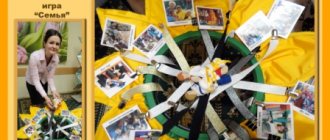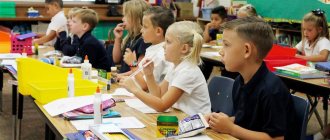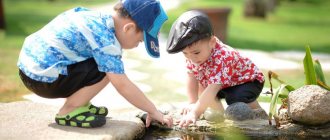features of the activities of a teacher in a preschool institution article on the topic
Features of the activities of a teacher in a preschool institution.
A special role in the implementation of educational and educational functions is played by the teacher of a preschool institution. He is a specialist in the education, training and development of preschool children. A.I. Grigorieva defines a teacher educator as “an original creative personality, distinguished by a humanistic value orientation of his own existence, a high communicative and reflective culture; a professional capable of creating conditions for the development of a child’s personality, systematically seeing pedagogical reality, and applying modern educational technologies.” That is, certain requirements are imposed on the teacher’s personality; he must have special knowledge and skills, as well as certain personal qualities. Among them we can distinguish main and secondary qualities. Without the presence of the main qualities, it is impossible to become a highly qualified teacher, and these include, first of all, love for children, for educational activities themselves, the presence of special pedagogical knowledge, a high level of intelligence and general culture and morality, broad erudition, pedagogical intuition, as well as mastery of various teaching methods and raising children. Compliance with secondary requirements is not necessary for a teacher, but it contributes to more effective upbringing and education of children. The secondary (unstable) qualities include: communication, goodwill, cheerful disposition, predominance of a positive mood, good taste, etc. The combination of main and secondary qualities makes up the unique and original personality of the teacher. (Weiner 2001)
The priority of the personality of a preschool teacher is determined, first of all, by his responsibility to the age characteristics of the students, taking into account which is mandatory and necessary as in no other learning situation; it is due to the difficulties of the play form of learning, which corresponds to the leading type of activity of the child during preschool childhood, as well as the purpose and content of educational and developmental education. The teacher of a preschool educational institution must be humanistically oriented towards the development of the child’s personality through various means.
In addition, a teacher of a preschool educational institution must have certain knowledge: methodological - knowledge of the general principles of studying pedagogical phenomena, the laws of socialization of upbringing and teaching; theoretical - knowledge of the goals, principles, content, methods and forms of pedagogical activity and patterns of formation and development of the personality of a preschool child; methodological - knowledge of methods of raising and teaching preschool children; technological (knowledge of ways and techniques of raising and teaching preschool children.
Functions of a teacher in a preschool institution
The main functions of a teacher can be distinguished: educational, educational, developmental, normative, communicative, informational, coordinating, reflective and diagnostic.
The educational function is aimed at the conscious mastery by teachers of a preschool educational institution of didactic theory, a system of professional knowledge, abilities, skills, and social experience in the interests of the individual and society. This function is also aimed at satisfying information knowledge, because Currently, preschool institutions are called educational institutions. Theoretical and practical aspects of the implementation of the educational function of professional pedagogical culture ensure mastery of the content, organizational and methodological foundations for the upbringing and training of preschool children.
The developmental function lies in the fact that the improvement and activation of didactic knowledge and skills of educators occurs simultaneously with the development of professional thinking, memory and speech, pedagogical abilities, which allow the use and application of a more effective and creative approach in creating conditions for the harmonious development of children, the organization of educational educational process in a preschool educational institution.
The normative function of the professional pedagogical culture of the teacher regulates the teacher’s activity in the system. Knowledge of the norms of pedagogical activity gives the educator confidence in the correctness of his actions. Pedagogical norms, performing the function of values, help the teacher choose the most optimal ways of activity, establish ideals and professional priorities. The norms of pedagogical activity are aimed at resolving contradictions that arise in the process of interaction between the teacher and children, colleagues, parents and administration, at ensuring their cooperation and achieving joint actions in the upbringing of preschool children.
The information function in the work of a teacher is associated with all its functional components. The teacher must be oriented in the diverse flow of psychological, pedagogical and methodological information, be able to use various media, and master the means of information technology; be able to work with information using these means to meet personal and social needs.
The coordinating function of professional pedagogical culture lies in the variability of the content of the educational process and the selection of technologies. This function is the basis for improving his future professional activities. The educational function is associated with the implementation of the coordinating function.
Reflexive function. Reflection is associated not only with the educator’s understanding of his own pedagogical activities, but also with the assessment of the personal qualities, emotional reactions and cognitive abilities of the “reflector” by other educators, supervisors, and teachers. The effectiveness of the implementation of the function under consideration is closely related to the teacher’s presence of such qualities as critical thinking, the desire for analysis and evidence, the validity of his position, and the readiness to adequately perceive information.
Pedagogical reflection is a self-analysis of the activities carried out and an assessment of the results obtained. The teacher must be able to reflect on the reasons for successes and failures, mistakes and difficulties in the educational process in order to make changes in subsequent activities and achieve better results.
The diagnostic function consists of the ability to solve complex professional problems at a high level, comprehensively and creatively, namely: to build diagnostic goals, predict the results of diagnostic activities, select or develop diagnostic tools; together with other teaching staff (psychologists, music worker, speech therapist) carry out competent psychological and pedagogical diagnostics, analyze and interpret diagnostic data, design and implement the educational process based on system diagnostics.
Communication function. The communicative abilities of a kindergarten teacher are understood primarily as the ability to communicate, which has its own specifics in the field of pedagogical interaction. The teacher acts here as a subject of influence in interaction (direct and indirect) with the child and the children's community of the school; subject of personal and professional development of oneself (self-development) as an educator; the subject of the formation and development of the teaching staff as a team of educators; a subject of interaction with the family, representatives of society, social communities (institutions) that “reach out” to the child, stimulating the manifestation of their educational potential. Therefore, one of the important qualities of a teacher is the ability to organize long-term and effective interaction with preschoolers, and in addition, the ability to coordinate their activities with other participants in the educational process.
The teacher must be able to correctly assess the interaction situation, which consists of the ability to observe the situation, select its most informative signs and pay attention to them; correctly perceive and evaluate the social and psychological meaning of the situation.
The communicative abilities themselves include the ability to communicate with a wide variety of people; the ability to extract as much necessary information from communication as possible; the ability to prevent the occurrence of conflict situations, the ability to resolve conflicts that have already arisen; the ability to behave in such a way as to be correctly understood and perceived by other people; the ability to give another person the opportunity to express their interests and feelings. In addition, it should be taken into account that in the process of communication, along with verbal forms, non-verbal forms of pedagogical interaction play an important role, since non-verbal means of expression often carry a large amount of useful information.
It should also be taken into account that the educational process involves not only individuals (teachers, parents, children), but also various communities. It is necessary to distinguish between formal, structured, organized associations of people and informal, unstructured, event-based communities. The criteria for distinguishing such ideal structures as organizations and communities are in the features of unifying people. An organization is a purposeful association of people according to a predetermined structure; community emerges spontaneously. Relationships in an organization are determined primarily by the given nature of joint activities; in a community - by norms and values that are not given, but introduced by its members. Since in a preschool institution both organizations and communities need to arise in the team of teachers, it is necessary to pay attention to the formation of relationships between teachers, which is subject to many factors. The norms and values set by the nature of the work can change under the influence of introduced norms. Complex principles of interaction can also affect the educational process.
The educational function of a teacher’s professional and pedagogical culture reflects the area of educational activity. The teacher, on the basis of psychological, pedagogical and special knowledge, cultivates beliefs, motives, values, and norms of behavior in relation to surrounding people and the natural environment. In addition, educational activities are aimed at children and are primarily related to ensuring the personal, intellectual and physical development of the child.
The personal development of a child in a preschool educational institution consists of familiarization with universal and cultural values, the development of morality, positive personal qualities, the development of emotions and feelings, the development of social interaction skills, etc.
The intellectual education of a child is aimed at the development of cognitive processes, and is carried out through various cognitive and creative activities (drawing, modeling, games, design, etc.), minimal preparation of children for schooling is carried out.
Of particular importance is the organization of a child’s physical education in a preschool educational institution. In the preschool period, the basics of movement are mastered, a base of motor experience is created, from the elements of which all human motor activity is subsequently formed. (Ashikova S. 2004)
Bibliography:
- Ashikova S. Teacher and parents. Preschool education - No. 10, 2004 pp. 44-47
- Weiner E.N. Formation of a health-preserving environment in the general education system // Valeology.-2004.-No.1.-P.21-26
Pros of the profession
In addition to the most important advantage - immersion in the world of childhood - the profession of a senior teacher has many other advantages.
- It has status and prestige; the manager has something to respect himself for.
- Assumes a stable salary.
- Gives you the opportunity to control your child in a preschool educational institution.
- Most kindergartens provide free food to staff.
- All benefits become available to employees of government agencies.
- The profession of a senior educator is in demand in the labor market.
- A specialist in the field of pedagogy has the opportunity to retire early (after 25 years of experience).
- A senior teacher is an interesting position that does not involve routine and monotony.
- Constant self-improvement and self-education is possible due to the regular introduction of innovations.
- Supervising less experienced employees contributes to one’s own discipline and desire for knowledge.
Who can get this position
Secondary pedagogical education will enable the applicant to apply for positions: assistant teacher, junior teacher, teacher. Most often, these specialists work in the garden for several years, participate in events, try to write educational programs, and after five years of such activity they can receive a promotion to senior teacher. In some commercial preschool educational institutions this period is slightly reduced.
In accordance with the law, people who have a teacher’s diploma and have completed a professional retraining program have the right to work as a senior educator (methodologist).
How to become a good mentor?
They say that a good teacher is not made, but rather born . However, this is a rather controversial statement. Our editors agree that it’s all about the desire to learn and develop.
A good teacher is a person who sincerely loves his profession, loves children and what he teaches.
In order to become a truly good teacher, you need to constantly learn and develop , analyze your successes and failures and move on.
The role of the kindergarten teacher is very often underestimated, because his influence on the child is not always easy to notice. But in fact, this is the first adult after mom and dad who has a very serious influence on the formation of views, worldview, and he is there at that crucial moment when your son or daughter begins to realize himself as an individual.






